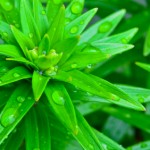Summer gardening: what to do in July
 July is usually the month of hot summer days and warm temperate nights. However, it won’t have escaped your notice that this July has been decidedly wet so far; and it doesn’t look like that’s going to change anytime soon. Nevertheless, your garden still needs care and attention during the next few weeks and we’ve got the best tips and advice to see you through to August.
July is usually the month of hot summer days and warm temperate nights. However, it won’t have escaped your notice that this July has been decidedly wet so far; and it doesn’t look like that’s going to change anytime soon. Nevertheless, your garden still needs care and attention during the next few weeks and we’ve got the best tips and advice to see you through to August.
Overwatering
Normally during July we would be telling you to keep any eye on watering and make sure you do it every day. However, as this is now the wettest July on record, we thought that would be a moot point. What we will say is that you should keep an eye out for flooding. Areas of your garden can quickly flood and many plants and flowers will drown if submerged. If you’re worried about a particular plant then its best to get it potted and move it somewhere drier just to be safe.
Slugs and snails love the damp
The wet weather has brought out the slugs and snails in their hundreds. These pesky garden-invaders may move slowly but they can decimate a garden in no time. Crushed egg shells and shop-bought deterrents can help but one of the best methods to prevent damage to your plants is to check them regularly and attract as many birds to your garden as possible.
Feed and trim roses after first blush
Rose plants can bloom a number of times during one year, depending on the species. It is important to remove deadheads and trim your rose bush after each bloom to ensure that the next one is successful. You should also make sure it is fed regularly with the correct feed and kept free from pests and disease.
Monitor your greenhouse for early developing diseases and pests
In this wet and (sometimes) warm weather, your greenhouse can become a hot-bed for diseases. Bacteria and funguses grow best in warm, wet conditions and young seedlings are particularly susceptible. Regularly check your greenhouse for anything sinister growing on your plants and make sure there is plenty of space between each one to prevent contamination. Watch for rising humidity and try to keep the leaves and stems of your plants dry; only water the soil.
Pick fruit as soon as it ripens
Lots of water and mild temperatures means some fruit trees and bushes may start blooming a little early this year. Save your ripened fruit from hungry birds and insects by picking it as soon as it is ready. Protecting fruit trees as they grow is important but once the fruit is ripe, get it off the branch and into your kitchen. This also gives the under-ripe fruit more room to grow. As well as harvesting your fruit crop, herbs can also be stored up for later use. Clear out a drawer in your freezer and stash your fruit and herbs here for later use.


